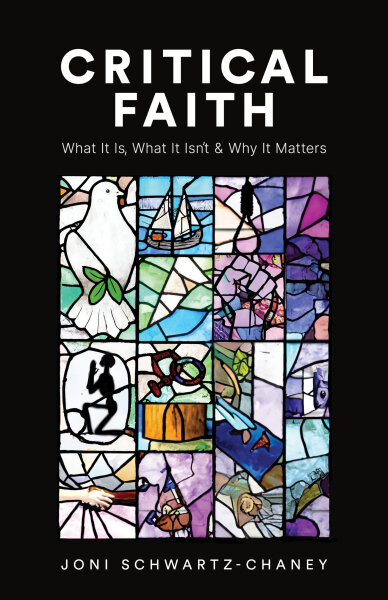Schwartz-Chaney does a phenomenal job of making complex, convoluted, and controversial concepts absolutely clear. Her passionate writing is simple and concise, allowing any reader to fully understand the enormity of the mutually inclusive connection between critical race theory and faith. Critical Faith is a must-read for believers and non-believers, as well as scholars and non-academics.
Near hysteria has erupted in the media, state and federal legislatures, community boards, and churches around critical race theory (CRT). Despite the term's history, development, and clearly defined meaning, it has become a catch-all for white America's fears, deflections, and equivocations on race, society, and the law. Christians are no exception. Their critiques routinely claim that CRT is rewriting of American history, that it is anti-democratic, and even heretical.
Critical Faith presents a counter argument to these claims and insists that CRT is a tool to grapple with the thorny issue of race in both society and the church. In a reasoned tone, Critical Faith defines the origins of CRT, explains what the theory is, and demonstrates its merits from teaching experiences of the author.
Schwartz-Chaney argues that CRT is the victim of what Patricia Williams calls "definitional theft," and that by recovering its original meaning, Christians can move past mischaracterizations and caricatures toward a more nuanced view of race, racism, and the tools available to make progress in the church and in society.
- Publisher Fortress Press
- Format Paperback
- ISBN 9781506491554
- eBook ISBN 9781506491561
- Dimensions 5.5 x 8.5
- Pages 197
- Publication Date April 23, 2024
Endorsements
Dr. Wendy M. Nicholson, PhD, executive director of diversity, equity, and inclusion, LaGuardia Community College
In her book Critical Faith, Dr. Joni Schwartz-Chaney casts a strong and focused light on an American appropriation of Christianity that has sadly accompanied, historically, the national acceptance of racism and colorism. Nevertheless, as a fervent Christian believer, she has written a text that is full of hope in what Christian congregations can be, even as she illuminates the tragic effects of our country's refusal largely to clearly see the effects of our past on the present. Explaining and using the lens of critical race theory to demystify the stories co-religionists tell one another about who American Christians are, Dr. Schwartz-Chaney successfully helps us to both understand and confront an enduring racial segregation in our pews. Critical Faith attempts to offer a rational way for millennial American Christians to comprehend ourselves, as the writing of Karl Barth aided a post-war Christianity and as James Cone gave clarity to Christians following the era of civil rights. Dr. Schwartz-Chaney successfully presents a way for Protestant and Catholic churches to be anti-racist and to see themselves as the prophet Micah suggested we are expected to be before our God.
Rev. Gregory Chisholm, SJ, superior of the Jesuit community, Baltimore, Maryland; former pastor, St. Charles Borromeo Roman Catholic Church, Harlem, New York
In a time when segments of the Christian community have seemingly lost their minds--that is, the ability to think critically and biblically about issues of race--Dr. Schwartz-Chaney's book, Critical Faith: What It Is, What It's Not, and Why It Matters, is a breath of fresh air as she reclaims the issues of race and racism for the church today.
Rev. Bob Smith, retired pastor, professor, and founding director of the Fort Wayne School of Urban Ministry
Joni Schwartz-Chaney is a lifelong friend and a sister in Christ. I had the privilege of serving as her pastor during the formative years of her spiritual journey. I have always been impressed with her intellectual honesty and willingness to challenge conventional wisdom without resorting to self-righteous academic haughtiness. This book is a testament to her courage and tenacity while grappling with a controversial concept. I gladly recommend this important work, especially to the faith community where CRT has been largely and unfairly demonized. I would hope that the church in America would grant her a fair hearing and take her admonitions seriously.
Rev. Seth G. Tidball, pastor, Lake Cumberland Church of the Nazarene
